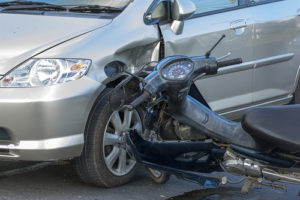 Motorcycle accidents represent a fraction of U.S. vehicle accidents that occur every year. But according to one Canadian study, these accidents are far more likely to cause serious injury or death.
Motorcycle accidents represent a fraction of U.S. vehicle accidents that occur every year. But according to one Canadian study, these accidents are far more likely to cause serious injury or death.
Canadian researchers found that the death rate in the motorcycle accidents they studied was five times higher than the death rate in car accidents. They also found that the risk of severe injury was ten times greater, and that health care costs could be six times higher than in comparable car accidents.
Why are motorcycle accidents more dangerous? Researchers point to one primary reason: motorcyclists don’t have the protection of a vehicle’s frame and paneling in a crash. Nor do they have access to high-tech safety features like front and side airbags.
Instead, the impact of a motorcycle accident is far more likely to hit the rider’s body directly, causing severe injuries.
Despite the added danger, researchers and policymakers aren’t focused on banning motorcycles. Instead, they say, it’s important to look at ways that riding can be made safer. Universal motorcycle helmet laws, bike safety class requirements, and cracking down on drunk driving from both bikers and car drivers can all help to make the roads safer, according to the Governors’ Highway Safety Association (GHSA).
Researchers are also looking at ways that the motorcycle itself can be made a safer vehicle to drive. For instance, they’re looking at ways to use anti-lock braking systems on motorcycles. Anti-lock brakes have helped to make cars safer, and many manufacturers believe they could offer similar benefits to bikers.
At Rubin, Glickman, Steinberg & Gifford, P.C., our experienced attorneys offer full-service legal representation in suburban Philadelphia and throughout Southeastern Pennsylvania. For the experience, reputation, and results that you can trust, call us today at 215-822-7575.
The articles on this blog are for informative purposes only and are no substitute for legal advice or an attorney/client relationship. If you are seeking legal advice, please contact our law firm directly.








